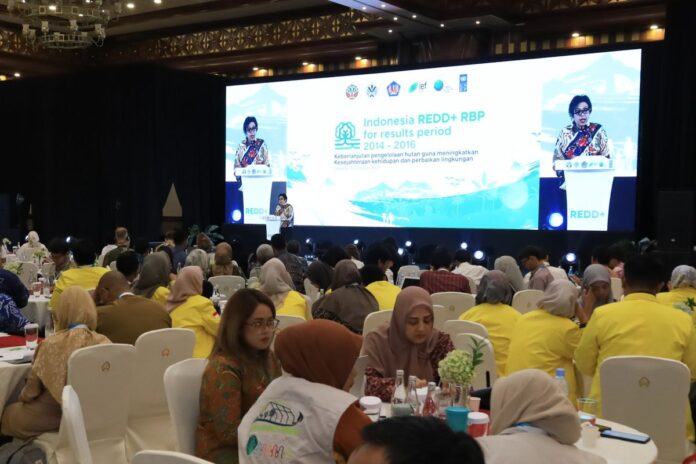Ecobiz.asia — Indonesia has officially concluded the Reducing Emissions from Deforestation and Forest Degradation (REDD+) Result-Based Payment (RBP) project under the Green Climate Fund (GCF) Output 1, which was financed by USD 103.8 million awarded for verified emission reductions of 20.25 million tons of CO₂ equivalent (CO₂e) achieved during the 2014–2016 period.
Implemented by the Ministry of Environment/Environmental Protection Agency (MoE/EPA), the project represents a key milestone in Indonesia’s application of result-based finance to strengthen national climate actions and forest governance.
The GCF proceeds, managed transparently by the Environmental Fund Management Agency (BPDLH) in partnership with UNDP, have been used to strengthen the National REDD+ Strategy 2021–2030, establish the National Registry System for Climate Change Control (SRN-PPI) and SIGN SMART, and build institutional capacity at both national and sub-national levels.
Rosa Vivien Ratnawati, Secretary General of the MoE/EPA, said the completion of the project demonstrates the success of Indonesia’s performance-based climate approach.
“With strong coordination and collaboration, REDD+ management can run effectively and achieve its targets. Indonesia remains committed to reducing emissions by 31.89 percent independently and 43.20 percent with international support by 2030, guided by transparency and accountability,” she said on Monday (Oct 6, 2025).
She added that the project provides a solid foundation for Indonesia’s upcoming climate milestones, including FOLU Net Sink 2030 and the Net Zero Emission 2060 vision.
“Climate change mitigation is not only about protecting the planet but also about building a resilient, green, and inclusive future,” she said.
Hermant Mandal, Director for Asia and the Pacific at the GCF, praised Indonesia’s achievement as a concrete example of how developing countries can deliver verified results through climate partnerships.
“Indonesia has demonstrated that ambitious climate goals are attainable through strategic collaboration and strong commitment to low-carbon development,” he said. “This is a clear example of Indonesia’s leadership in global climate action.”
BPDLH President Director Joko Tri Haryanto said the fund has produced tangible social and environmental outcomes.
“It’s not only about preserving forests but also improving community livelihoods. With the support of UNDP, ministries, and partners, this program has created real benefits on the ground,” he said.
UNDP Resident Representative Sara Ferrer Olivella said the project’s success reflects a trusted partnership between Indonesia and its development allies.
“This achievement shows that climate targets can be reached when we work together. UNDP will continue to support Indonesia as a reliable partner in environmental governance,” she said. ***





